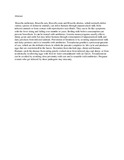| dc.description.abstract | Brucella melitensis, Brucella suis, Brucella canis and Brucella abortus, which normally infect various species of domestic animals, can infect humans through unpasteurized milk from infected animals or from contact with reproductive tract fluids. They cause flu like symptoms with the fever rising and falling over months or years. Boiling milk before consumption can prevent brucellosis. It can be treated with antibiotics. Listeria monocytogenes usually affects sheep, goats and cattle but may infect humans through consumption of unpasteurized milk and dairy products from infected animals. Prevention of listeriosis is by avoiding unpasteurized milk and dairy products and it is treatable with antibiotics. Toxoplasma gondii is a protozoan parasite of cats, which are the definitive hosts in which the parasite completes its life cycle and produces eggs that are exteriorized in the faeces. Secondary hosts include pigs, sheep and humans. Humans catch the disease from eating poorly cooked meat from infected pigs and sheep, or from accidentally swallowing eggs with food or water contaminated with cat faeces. Toxoplasmosis can be avoided by avoiding close proximity with cats and is treatable with antibiotics. Pregnant women who get infected by these pathogens may miscarry. | en_US |

